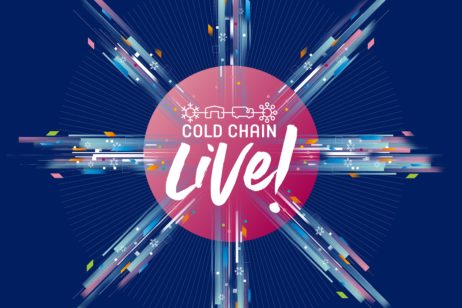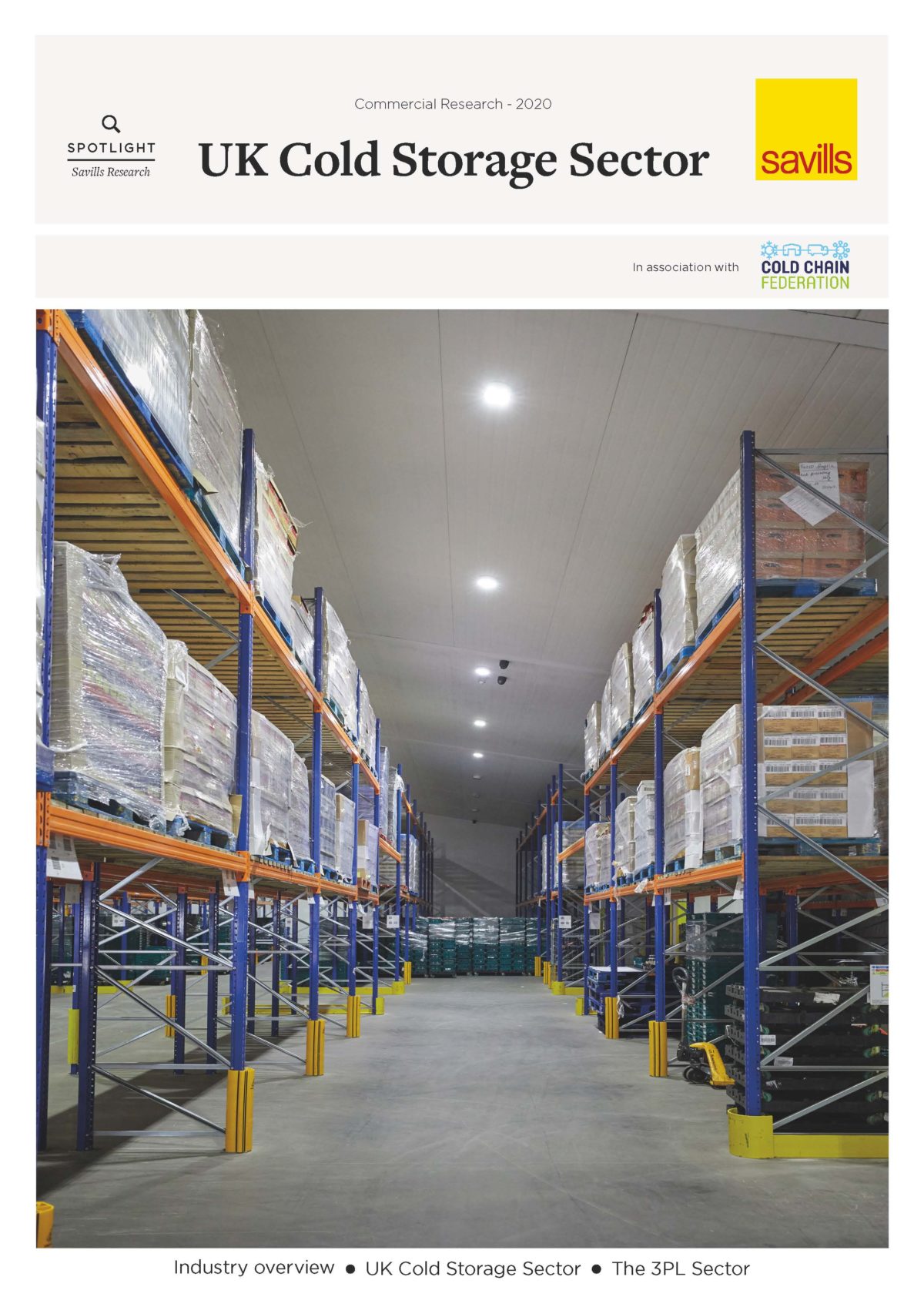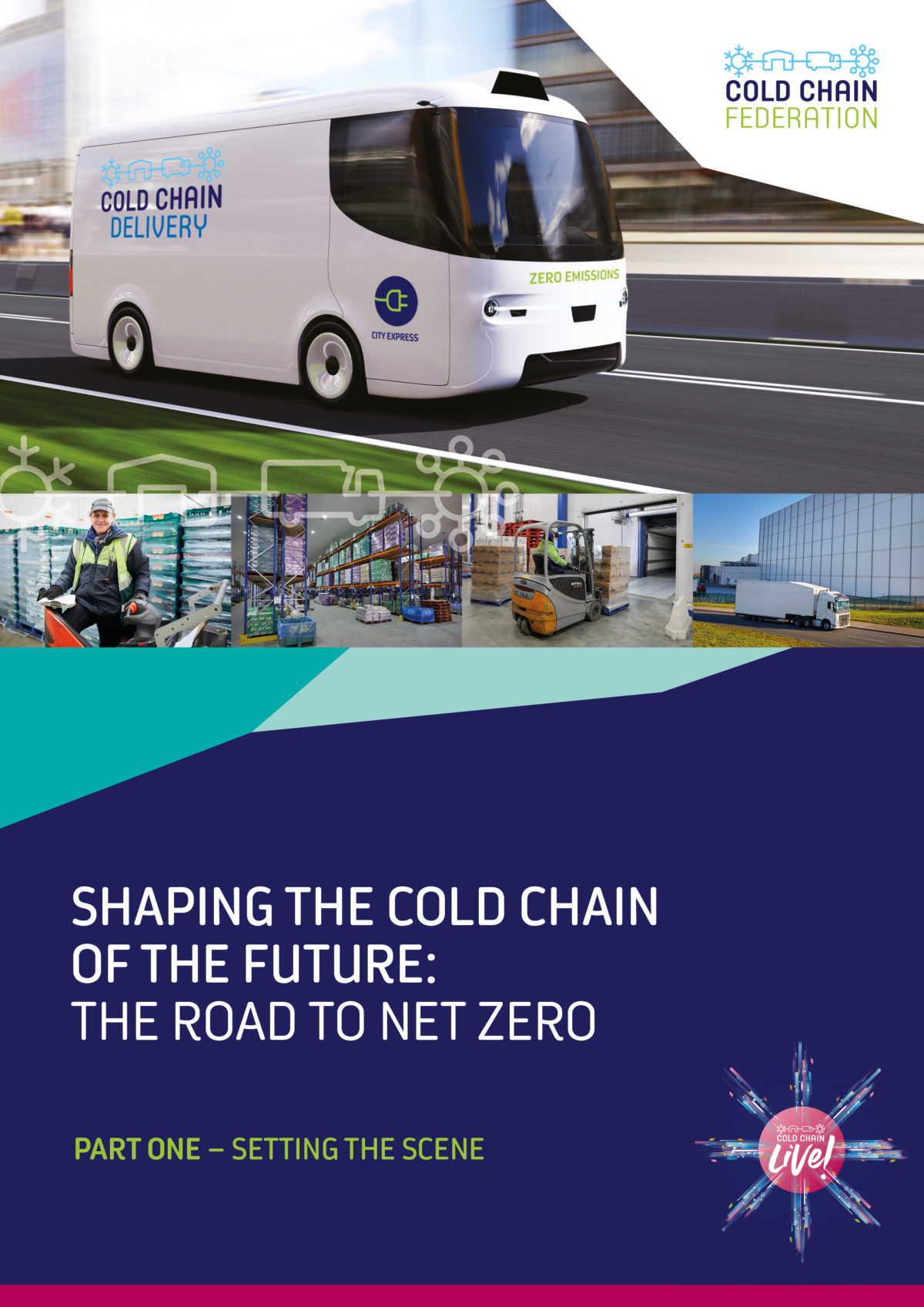
TOWARDS A NET ZERO COLD CHAIN
Welcome to the resources section for COLD CHAIN ECOSYSTEM, the final week of 4 in the COLD CHAIN LIVE! TOWARDS A NET ZERO COLD CHAIN series.
Here you will find links to thought-leadership papers and other relevant information plus this week’s leader’s interview video and the recording of the live workshop.

UK COLD STORAGE SECTOR
As the new Cold Chain Federation we intend to be the impartial knowledge centre for cold chain in the UK. We are investing in unique and impartial data and insight to help those within, and outside our industry to have a better shared understanding of the size, scale, trends and value of temperature-controlled logistics in the UK.
We are grateful to partner with Savills, whose expertise in industrial logistics is without question. This report is the start of a partnership that will see us build our knowledge about the existing cold storage estate, its strengths and weaknesses and the opportunities it presents for investors, operators and customers.
UK COLD STORAGE SECTOR
We are grateful to partner with Savills ,whose expertise in industrial logistics is without question. This report is the start of a partnership that will see us build our knowledge about the existing cold storage estate, its strengths and weaknesses and the opportunities it presents for investors, operators and customers.
INSIGHT
Here you will find links to papers from our speakers and other key reference sources containing useful information around this week’s theme.

Kevin Mofid, Head of Logistics & Industrial Research, Savills
The Cold Chain Federation has teamed up with Savills to produce he first ever comprehensive analysis of UK cold storage facilities. Kevin takes a look at some of the findings.

Prof Toby Peters, Professor in Cold Economy, University of Birmingham
Creating a robust blueprint for sustainable and cost-effective food logistics
Toby explores the interdependencies that will be needed to design resilient, zero-emission systems to feed a growing global population and support the people involved in food production.

Amy Shortman, Director for Product Marketing, Overhaul
Digitalisation of the Cold Chain
The solution to maintaining the safety and integrity of cold chain products, while documenting an established chain of custody, requires technology. Yet, most existing solutions designed for supply chains offer limited information that is fragmented across multiple platforms.

John Clark, Director, Star Data Analytics
Does “what gets measured” really “get managed”?
The phrase “What gets measured gets managed” sounds good, however, when it actually comes to practical experience John argues that it rarely works out that way.

Professor Judith Evans, London South Bank University and Refrigeration Developments and Testing Ltd
Zero net carbon – food cold chain challenges – a research perspective
Judith explains the opportunities for academia and research to get involved with the varied future cold chain developments that must be made to hit the UK’s 2050 net zero target.
Further Reading
The Future of UK supply chains in a disrupted world: Brexit and Covid-19 (LSE Blog, 2020)
UK Cold Chain Logistics Market by End User: Opportunity Analysis and Industry Forecast, 2019-2026 (Allied Market Research, 2019)
LEADER’S INTERVIEW

This week Shane talks to Stephen Lawrence, Managing Director, iSec and Chief Executive Magnavale Group. Stephen first bought a cold store in 2011, since then his Magnavale business has grown to be one of the largest 3PL businesses in the UK cold chain. Also, through his i-Sec business he is involved in exciting cold chain development projects in London and elsewhere. He and Shane discuss the opportunities of UK cold chain and the scope for innovation and change at all levels.
WORKSHOP PRESENTATIONS
All the individual presentations will be available here to watch at your leisure. In the meantime, here’s the whole thing and the slides can be found below.
PRESENTERS’ SLIDES
Click on the presenter’s name below to download their slides

SHAPING THE COLD CHAIN OF THE FUTURE: THE ROAD TO NET ZERO
PART ONE – SETTING THE SCENE
We are working to bring our industry together, to define what we mean by a net zero cold chain and to ask ourselves where the gaps are in our knowledge and where the potential is for collaboration. This paper starts the conversation and is the basis for engagement within and outside our industry.
Road to Net Zero Part 4 - Cold Store of 2050
The Cold Store of 2050 is our vision for how temperature-controlled warehouses could evolve to achieve a step change in energy efficiency whilst driving energy transformation in the UK as part of the transition towards a net zero economy by 2050. The report details the technologies which could become more widespread, the barriers to their adoption and how businesses, government and those responsible for the UK energy network will need to collaborate to ensure the opportunities and benefits detailed in this report are achieved.
SHAPING THE COLD CHAIN OF THE FUTURE: THE ROAD TO NET ZERO (PART THREE - THE JOURNEY TO EMISSION FREE TEMPERATURE-CONTROLLED REFRIGERATION ON ROAD VEHICLES)
The Journey Towards Emission Free Temperature-controlled Distribution on Road Vehicles is our vision for how transport refrigeration units (TRUs) can transition away from diesel, to emission free alternatives in line with the UK’s decarbonisation and air quality targets. It sets out our view on the technological outlook for TRUs, how operators and manufacturers will adapt to drive down emissions and finally the financial, infrastructural and regulatory support which will be required to enable us to meet our ambitious targets.
SHAPING THE COLD CHAIN OF THE FUTURE: THE ROAD TO NET ZERO (PART TWO - DEFINING A NET ZERO COLD CHAIN)
Although businesses operating the cold chain are committed to reducing their greenhouse gas (GHG) emissions and other pollutants in line with UK Government targets, we are not as yet in a position to estimate the extent to which we can reach net zero by 2050 and to set our own firm targets. The guide sets out why it is imperative to determine the carbon footprint of the cold chain, and also the Cold Chain Federation’s commitment to not only support members to assess their own emissions, but to also support recently announced academic studies to assess the total emissions from the UK cold chain.
SHAPING THE COLD CHAIN OF THE FUTURE: THE ROAD TO NET ZERO (PART ONE - SETTING THE SCENE)
This document is the basis for the Cold Chain Federation's engagement within and outside our industry; to define what we mean by a net zero cold chain and to ask ourselves where the gaps are in our knowledge and where the potential is for collaboration.
Headline Partners
Supported by

